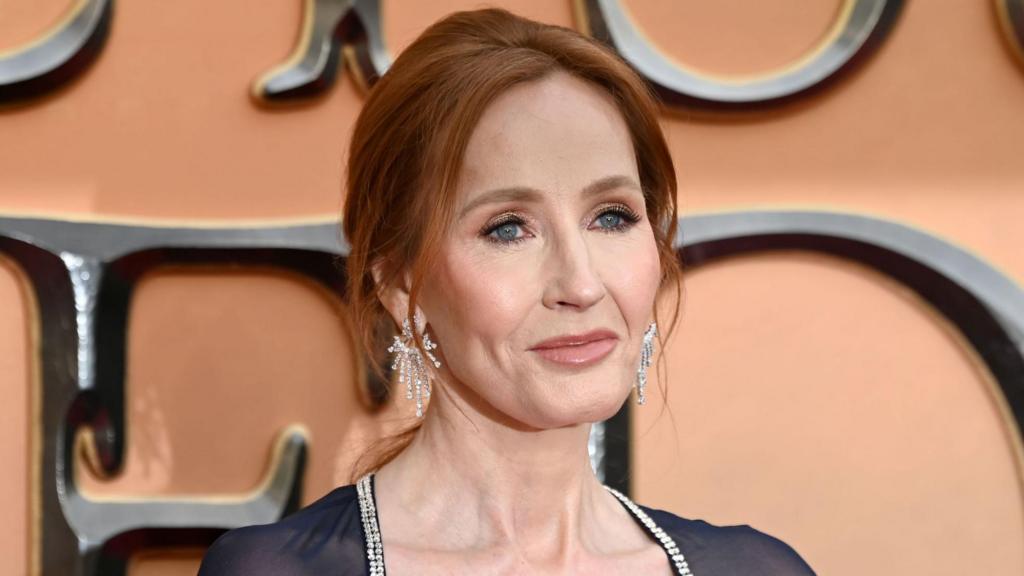J.K. Rowling has responded to Nicola Sturgeon after the former First Minister of Scotland’s memoir reignited their long-standing dispute over gender issues.
In her book, Sturgeon recounts experiencing a surge of “vile” abuse after Rowling posted a selfie wearing a T-shirt emblazoned with the slogan: “Nicola Sturgeon, destroyer of women’s rights.”
Sturgeon stated that the incident made her feel “more at risk of possible physical harm.”
Rowling, defending her actions, accused Sturgeon of a blatant denial of reality concerning transgender issues.
In a review of the book, published on her website, Rowling said that her intention had been to encourage journalists to “confront” Sturgeon on the topic.
Sturgeon, the MSP for Glasgow Southside, had previously stated on the BBC’s Newscast podcast that the Harry Potter author had every right to disagree with her but that the T-shirt “seemed to me quite incendiary.”
The two figures—arguably the most prominent in Scottish public life—have long been at odds politically, with Rowling critical of the former Scottish National Party leader’s efforts to legislate for easier legal gender changes.
The Scottish Parliament passed the legislation, but it was blocked by Westminster before enactment due to its potential impact on GB-wide equality law.
Opponents of the proposed law welcomed the block, arguing that it would have endangered women by granting biological males access to female spaces.
The campaigners, supported by Rowling, have since won a landmark case in London when the UK Supreme Court ruled that a woman is defined by biological sex for the purposes of the 2010 Equality Act.
Sturgeon maintains her support for the principle that an individual has the right to self-identify in the gender of their choosing.
However, she has also expressed regret for not pausing the Holyrood gender self-ID bill to seek common ground between supporters and critics, as the issue became mired in “rancour and division.”
“We’d lost all sense of rationality in this debate. I’m partly responsible for that,” she told ITV News.
Rowling remains unconvinced, writing on her website that Sturgeon “caused real, lasting harm” by presiding over a culture in which women who did not subscribe to her “luxury beliefs” were “silenced, shamed, persecuted,” and placed in degrading and unsafe situations.
“She is flat out Trumpian in her shameless denial of reality and hard facts,” the Edinburgh-based author adds.
Speaking on BBC Breakfast this week, Sturgeon stated she believed “forces on the far right” had sought to “weaponise” the trans issue to “push back on rights more generally.”
The comments echoed language she used in an interview with The News Agents podcast in 2023 when she said that some opponents of the SNP’s gender reforms were “deeply misogynist, often homophobic, possibly some of them racist as well.”
Rowling describes that as Sturgeon’s “basket of deplorables” moment, a reference to Hillary Clinton’s widely criticized dismissal of half of her rival Donald Trump’s supporters as racist, sexist, homophobic, xenophobic, and Islamophobic.
Rowling claims that with those comments, Sturgeon “demonised and stigmatised” survivors of sexual trauma, lesbians, women with disabilities, and “everyone concerned about safety, privacy, fairness and dignity for girls.”
In her memoir, Sturgeon also discusses double rapist Adam Graham—who was initially sent to a female prison after self-identifying as a woman called Isla Bryson—admitting she struggled to answer questions about whether the rapist was a man or a woman.
“I seemed weak and evasive. Worst of all, I sounded like I didn’t have the courage to stand behind the logical conclusion of the self-identification system we had just legislated for,” she writes.
“If you’re prepared to accept the foundational falsehood that some men are women, you’ll inevitably find yourself panicking like a pheasant caught in headlights one day,” writes Rowling in response.
The author, who in 2014 donated £1m to the campaign to keep Scotland in the UK, also accuses Sturgeon of omitting or downplaying important matters in her memoirs, such as the deletion of government WhatsApp messages during Covid; “tanking” educational outcomes; failures in procuring new ferries; and a police investigation into the SNP’s finances.
“Perhaps the most disgraceful omission,” she continues, “is the fact that Scotland continues to lead the whole of Europe in drug deaths.”
In a series of media interviews to publicize her book, Sturgeon has predicted that Scotland will be independent in 20 years or less and has defended her record as First Minister from 2014 to 2023.
She has insisted that she acted in the best interests of the nation during Covid and that reforms in Scotland designed to reduce poverty are now leading to progress in narrowing the attainment gap between the richest and poorest students.
Sturgeon, who will stand down as an MSP next year, also points out that she was exonerated by police investigating the finances of the SNP in an inquiry codenamed Operation Branchform.
Her husband, former party chief executive, Peter Murrell, faces a charge of embezzlement. The couple have since separated.
The much anticipated book by the former first minister is now on sale – and the BBC’s Scotland editor James Cook has been doing some speed-reading.
The former first minister also says she was partly to blame for a loss of “rationality” in the gender debate.
Sturgeon denied releasing details about a sexual misconduct investigation into the former SNP leader.
In a fresh extract from her memoir Sturgeon describes the breakdown of her relationship with her late mentor.
The first extracts from the former first minister’s new memoir are being serialised by The Times.

